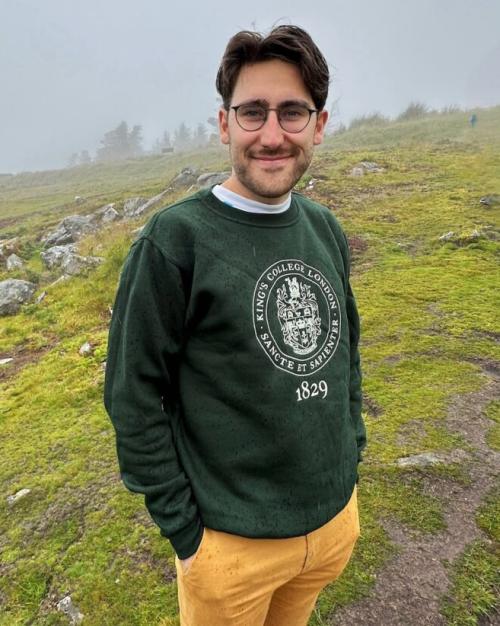Elijah Sheridan is a doctoral student in physics from Lansing, Michigan. He earned his B.A. at Vanderbilt University and now studies string theory under the guidance of Liam McAllister at Cornell.
What is your area of research and why is it important?
A challenge of modern physics is that our gravitational theory (general relativity) and our quantum theory of the other observed forces (the Standard Model, treating strong, weak, and electromagnetic forces) don’t work together well. My research studies string theory, the best known candidate for a unifying theory of quantum gravity. In particular, I develop methods in computational mathematics for calculating properties of particular examples of string theory, and I also compare the physical predictions in these examples with empirical data from experiments, constraining the landscape of viable string theory models.
What are the larger implications of this research?
Though quantum gravity is most immediately relevant for exotic phenomena (e.g., black holes or the early universe) the aspiration is that its study (and solving the problems encountered along the way) ultimately trickles down and inspires advancement closer to home. History is full of unforeseen scientific utility: the World Wide Web was developed by physicists at CERN (home of the Large Hadron Collider) for experimental data storage. My research also involves development of accessible computational string theory tools: I hope this serves over time to lower barriers to entry and allow more aspiring young physicists to do string theory.
What does it mean to you to have received an NSF Graduate Research Fellowship?
As an undergraduate, I enjoyed learning a variety of subjects, from particle physics to geometry to machine learning. I was prepared to leave some of these behind, but at Cornell I’ve actually constructed a research trajectory that interweaves all of them. I’m excited because by supporting this line of research, the NSF is recognizing the promise not only of string theory but also of new interdisciplinary approaches to solving its problems. Also, so many people willingly helped me develop my application materials: This award leaves me resolved to pass on that generosity and help support future applicants however I can.
What will your fellowship allow you to do that you may not have been able to otherwise?
My research group has a rich international network of collaborators, and the NSF’s financial support will help me travel regularly to engage with these scholars and other physicists in the community. Summer schools and visits to co-authors in the U.S. and abroad have already proven so formative and inspirational, and I’m grateful to have increased access to such opportunities. Beyond research, in lieu of TA responsibilities I’ve personalized my trajectory as an educator: I intend to teach a minicourse at a local school district through Cornell’s GRASSHOPR program, and I’m a lead teaching fellow at the Center for Teaching Innovation.
If you participated in any of the Graduate School’s NSF GRFP programming last fall, either an information session or peer review session, how did it help you prepare your application?
Last fall I attended one of the peer review sessions, and the opportunity to have a current NSF graduate fellow thoroughly review my application materials and provide detailed feedback was extremely valuable. In particular, I was given insight into both the big picture of how to best tell the story of myself and my research and also the more technical aspects of how to optimize essay formatting and organization to meet NSF’s criteria and preferences.
What are your hobbies or interests outside of your research or scholarship?
Team sports were an important part of my childhood, and I’ve been grateful to have both casual and more organized opportunities to keep playing the sports I love at Cornell. I joined the Cornell Buds, the men’s club ultimate frisbee team, for two years—attending the national college championships with them in 2023—and have regularly played soccer through Cornell intramural leagues and pick-up games hosted by student organizations. I’m also just very happy to participate in the quintessential parts of Ithaca life, from events like Porchfest and Apple Fest to regular walks up and down the Cascadilla Gorge trail.
Why did you choose Cornell to pursue your degree?
Going into graduate school, I had broad interests but no finalized research plan. Cornell distinguished itself as a place that would effectively accommodate any direction I could envision: No matter my eventual path, there were world-class professors and graduate students who could support my learning.
I was also impressed by the McAllister group culture specifically: While many theoretical physics students work alone for many days in between check-ins with their advisor, my advisor prioritizes longer regular group meetings where learning and collaboration happens in real time. This was the vibrant research community I had hoped to find in graduate school!




